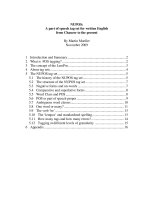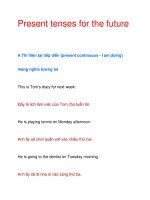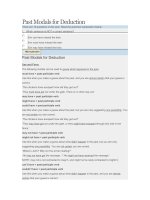Present Modals for Deduction
Bạn đang xem bản rút gọn của tài liệu. Xem và tải ngay bản đầy đủ của tài liệu tại đây (77.95 KB, 2 trang )
Present Modals for Deduction
There are 10 questions in this quiz. Choose the correct answer.
1. Which sentence is correct?
My purse isn’t in my pocket. It…
must be in my bag.
must in my bag.
mustn’t be in my bag.
Hide explanation
Modals for Deduction
Use and Form:
The following modals can be used to make guesses about a present situation.
must + infinitive
Use this when you make a guess and you are almost certain that your guess is correct.
‘Where’s John?’
‘He’s not here. He must be in the bathroom.’
may + infinitive
might + infinitive
could + infinitive
Use this when you make a guess but you are only suggesting one possibility. You are not
certain you are correct.
‘Where’s John?’
‘He’s not here. He may be in the bathroom, or he might be in the kitchen, or he could
beoutside.’
may not + infinitive
might not + infinitive
Use this when you make a guess about what is not true, but you are only suggesting one
possibility. You are not certain you are correct.
‘Where’s John?’
‘He’s not here. He may not be at work today.’
NOTE: Do not use could not here.
can’t + infinitive
Use this when you make a guess about what is not true, and you are almost certain that your
guess is correct.
‘Where’s John? Is he in the kitchen?’
‘No, he can’t be. I was in there a minute ago.’
NOTE: you cannot use: mustn’t + infinitive to make deductions about what is not true.
Common Mistakes:
1. Many students do not take the opportunity to use these structures when they can.
Maybe your bag is in the classroom. => Your bag might be in the classroom.









